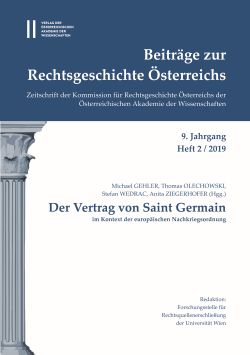
Beiträge zur Rechtsgeschichte Österreichs 9. Jahrgang Heft 2/2019, pp. 456-470, 2019/12/01
Der Vertrag von Saint Germain
im Kontext der europäischen Nachkriegsordnung
Population transfers have throughout history served governments as an instrument to achieve national or regimesecurity objectives. Population exchanges are a special case of such transfers. Here, states enter an intergovernmentalagreement in which the contracting parties decide on a reciprocal voluntary or involuntary transfer of populations.The perhaps most crucial precedent for such a measure is the Greco-Turkish population exchange agreed atLausanne in 1923. The present paper recalls the events that led to the agreement, which essentially legitimised expost one of the greatest humanitarian catastrophes of its time in order to solve the thorny Greco-Turkish minorityproblem once and for all. Relying mainly on the conference protocols I argue that the compulsory nature of the exchangewas imposed under duress, but against the wishes of the affected minorities, and in clear violation of thenascent international system of human rights.
Keywords: Eastern Question – Greco-Turkish War – Greece – Lausanne Conference – Ottoman Empire – Population Exchanges – Turkey